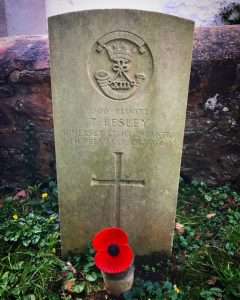Last week marked the anniversary of the death of Thomas Besley, a boy who shall remain forever seventeen years old. There was a poignancy in encountering his grave in a country churchyard.
One can stand on a hilltop at the Somme and see cemeteries stretching in a dotted line as far as one can see. One can drive through the flatlands of Flanders and encounter cemeteries in unexpected places. One can visit the memorials at Thiepval and the Menin Gate and Tyne Cot and countless other places and count tens and tens of thousands of names. One can visit Notre Dame de Lorette and scan the names of the 579,606 men of all sides who died in the region of Nord-Pas-de-Calais between 1914 and 1918. One can contemplate five and six and seven figure numbers, and then a moment comes when a single grave can come with a jolt.
The church of Saint Andrew in the Somerset town of Wiveliscombe is built in the red stone of the surrounding countryside, a deep red that contrasts sharply with the new green spring growth of the churchyard.
A sign at the gate placed by the War Graves Commission says that the cemetery contains Commonwealth War Graves. The CWGC headstones are readily identifiable, one stands against the graveyard wall near the west door of the church, over looked by the imposing tower. The inscription on Thomas Besley’s grave is sparse:
1800 PRIVATE
T.BESLEY
SOMERSET LIGHT INFANTRY
16TH FEBRUARY 1917 AGE 17
The Commonwealth War Graves Commission website says that Thomas Besley served in the 3rd/5th Battalion of the Somerset Light Infantry and that he was son of Steve and Fanny Besley, of Holelake, Wellington and was born at Wiveliscombe. No details are given of the circumstances of his death.
Thomas Besley’s headstone has the standard inscription provided by the Commission, any additional lettering would have been at the expense of his family; perhaps they were content with the form of words provided, perhaps they felt that being expected to pay for additional lettering only added to the pain.
There seemed a painful incongruity in the intrusion of the reality of the Great War into the tranquility of a country churchyard.
Thomas Besley was seventeen years old. Thomas Besley should not have been in the army, the minimum age for military service was eighteen. He must have falsified his age in order to enlist, no doubt in the company of others who similarly misrepresented their ages. Had he waited for conscription, waited to be called up, his papers would not have arrived until he was eighteen and he may have lived to a ripe old age.



Hi there,
Please excuse this random email, but I am currently in the process of researching Thomas Besley, and didn’t know if you had any additional information beyond what you have recorded in this post.
There seems to be a lot of confusion around his life – his family appears to have had two sons called Thomas, although neither were born around 1900 (one being in 1896, the other in 1904). Both were alive at the time of the 1911 census, again unusual, as normally a son would only share a name with an older sibling if that older sibling had passed away.
Thomas’ military records suggest that he had drowned accidentally, although again, documents challenge when this would be. Both are reliable army documents, with one giving the date of his death as 16th February 1915 and the other (the CWGC record) suggests 16th February 1917.
You may not have any additional information – and I recognise that your post is nearly three years old – but if you did know anything else, it would be gratefully appreciated! 🙂
Best wishes,
Richard
Hi,
Perhaps the mason responsible for the inscription made a mistake? The register of his effects does state he died in 1915.
There is another Thomas Besley from Wiveliscombe who appears to have served in the Royal Army Service Corps, but he seems to have been born in 1882.
Confusing!
Hi there, I believe I can help Thomas Besley (1896) whos grave you are talking about I believe did Drown. He is the true son of Steve (1860) and Fanny Besley (1858) (nee Milford), the other Thomas Besley (1904) is my great grandfather, He was brought up by his grandparents Steve and Fanny as their own, due to his mother Elisabeth Waterman (1879) dying in child birth and his Father William Besley (1880) remarried a Beatrice Prout. It is my understanding that my great grandfather Thomas Besley believed his dad was also called Thomas and had died in the war, it took me many years to figure this out, I hope this helps.
Hi Sylvia,
Perhaps you could contact the CWGC as a family member and point out the mistake on the stone?